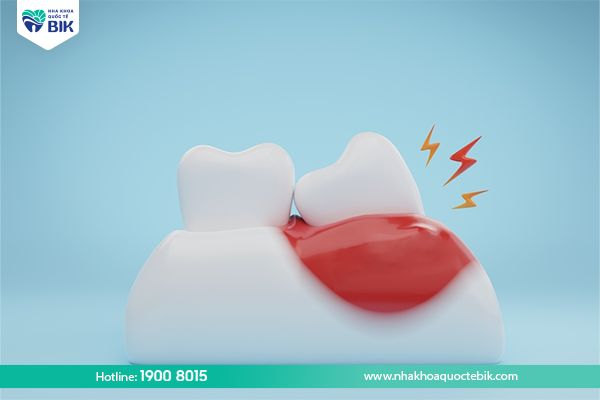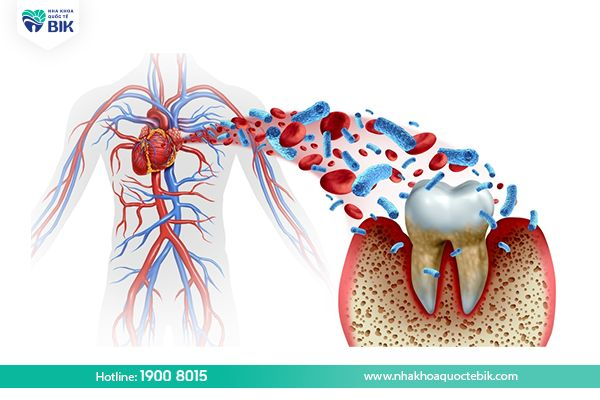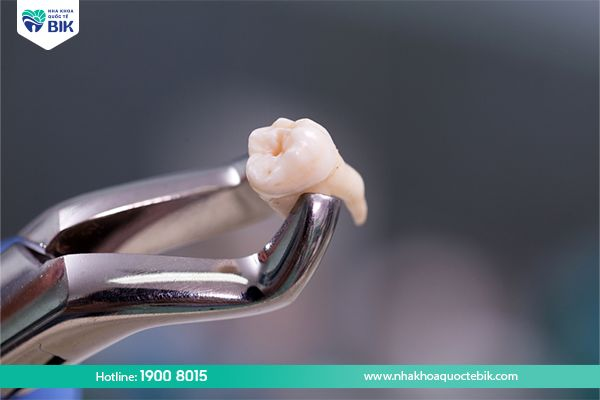Pericoronitis is a condition in which the gums completely cover the growing wisdom teeth, causing strong impact from the teeth, causing pain that greatly affects the daily eating process. Similar to other inflammatory conditions, pericoronitis, if not treated promptly, will lead to dangerous complications for oral and general health. So let’s find out with BIK International Dentistry whether pericoronitis can heal on its own or how to treat it through the following article!
1. What is pericoronitis?
Wisdom teeth usually begin to appear in adulthood between the ages of 17 and 25. At this time, the jawbone, remaining teeth and gums have completely stabilized, so when the wisdom teeth emerge at the innermost position of the jaw, they will be held back by the gums. The condition where the surface of the wisdom tooth is completely covered by the gum inside the jaw is called pericoronitis.
The damaged gum due to the wisdom tooth growing higher and higher makes the patient feel very uncomfortable, painful and greatly affects the ability to chew. If not treated promptly, this condition will lead to widespread infection and spread to other parts.

2. Symptoms of pericoronitis
Pericoronitis is easy to recognize because the impact of wisdom teeth on the gums is very large:
2.1. Red and swollen gums
The gum covering the wisdom teeth is damaged, so it will change from light pink to darker red. When pressed, it will feel painful and in many cases there will be pus and water discharge.
2.2. Toothache
The most typical sign of pericoronitis is toothache, the pain will last continuously for many days. Even when swallowing saliva or opening the mouth, there is a feeling of pain, so eating and drinking is greatly affected.

2.3. Fever and signs of swollen lymph nodes
When suffering from pericoronitis, due to gum damage, the customer may feel a slight fever. In addition, the jaw angle may swell and there may be signs of swollen lymph nodes in the neck area.

2.4. Bad breath
The condition of swollen gums makes it impossible for the patient to close his mouth normally, making it difficult to clean his teeth, causing bad breath.

3. Can gingivitis heal on its own?
In fact, gingivitis around wisdom teeth can heal on its own, but in the case of the gums around the teeth, they are only slightly inflamed. Usually, gingivitis occurs while the wisdom teeth are still in the gums, when they have grown above the gum surface, this condition will stop, the gums will stop swelling and become healthy again. However, the case of wisdom teeth growing out of the gum surface is quite rare and it can still cause pain that lasts throughout the tooth eruption period (possibly up to several years).
Therefore, inflammation in general is a condition that is difficult to heal on its own without the support of medication, so pericoronitis is no exception, it is also very difficult to heal on its own. Moreover, pericoronitis has a high risk of developing into serious consequences if not treated promptly.
Therefore, when recognizing the signs of pericoronitis, customers should go to a reputable dental clinic for examination and timely treatment according to the doctor’s instructions.

4. Complications of pericoronitis
If pericoronitis is not treated promptly, it will lead to the following complications:
4.1. Purulent gingivitis
If the patient sees white pus starting to appear at the site of the infected gums, it means that the disease has progressed more seriously. At this time, the gum covering is severely infected, the pus will flow out and cause an unpleasant odor. This stage is often very difficult to cure with specialized medicine alone.
4.2. Gum infection
Gum infection is also one of the common complications if wisdom tooth pericoronitis is not treated promptly. If the infection in the early stages is not prevented in time, it will create favorable conditions for bacteria to continue to invade and attack the gums, causing infection. At this time, if the infected gum covering is not removed, the overall health will certainly be affected.

4.3. Affected adjacent teeth
Not all pericoronitis at the wisdom tooth position affects adjacent teeth. Once complications arise, bacteria will spread rapidly from the inflamed area to other teeth, causing the gums at the tooth root to be seriously affected.
4.4. Affects overall health
Pericoronitis at the wisdom tooth position often causes pain and discomfort for the patient, making it impossible to eat and drink normally. From there, you will become anorexic, lose taste with prolonged pain that easily weakens the body, makes you tired and even affects digestion.

5. Methods of treating gingivitis at the dentist
To know exactly the most suitable method to treat gingivitis, customers should go to a reputable dental facility to be examined by a doctor and advised to perform the following measures:
5.1. Prescribing antibiotics
To control the pain symptoms and relieve the inflammation, the doctor will prescribe some simple pain relievers or antibiotics. If the swelling is severe, causing the jaw muscles to stiffen, the swollen part rubs causing pain, the doctor may prescribe anti-edema drugs and systemic supportive drugs.
Note that customers should absolutely not use any drugs without a doctor’s prescription. This not only does not bring about effective treatment but can also affect overall health.

5.2. Gum flap surgery
This is a minor surgery performed when the doctor finds that the wisdom tooth is growing straight. This method will help free up the surrounding space to support the wisdom tooth to grow normally. The gum that needs to be cut will be quickly removed with a laser, the patient may experience pain, swelling and slight bleeding but it will quickly go away so there is no need to worry.
5.3. Wisdom tooth extraction
This is the most effective method to completely eliminate pericoronitis and prevent recurrence. Currently, patients can choose one of two methods of wisdom tooth extraction:
5.3.1. Traditional wisdom tooth extraction
This method uses a knife, forceps and lever to remove the wisdom tooth. This is a traditional method so it is low cost, the tooth extraction time is quite long, about 20 – 30 minutes, so the patient may feel tired mouth because of opening for a long time. In addition, wisdom tooth extraction by this method will bleed a lot and complications cannot be controlled.
5.3.2. Modern ultrasonic wisdom tooth extraction
Piezotome ultrasonic wisdom tooth extraction is a modern method today, the doctor will gently peel off the gum tissue and remove the wisdom tooth under the influence of ultrasonic waves. Therefore, wisdom tooth extraction by this method will not cause bleeding, is painless and does not cause complications.

So can pericoronitis heal on its own? The answer is no. Patients need to go to the dentist for examination and consultation on pericoronitis treatment methods at different stages. To ensure that the wisdom tooth treatment process is gentle, painless and highly effective, customers can choose BIK International Dental Clinic and be treated by a team of good doctors with many years of professional experience.


















